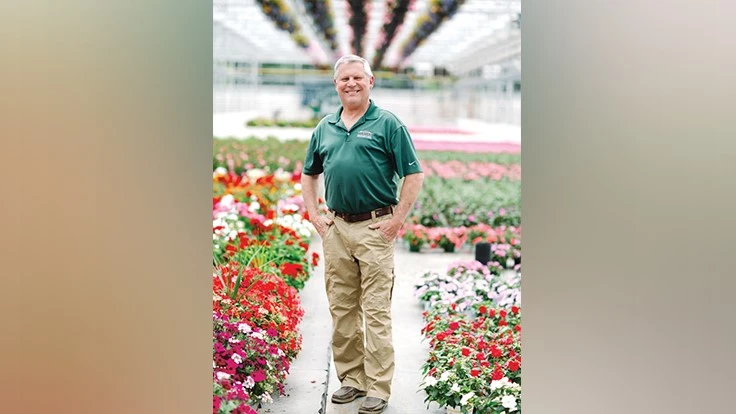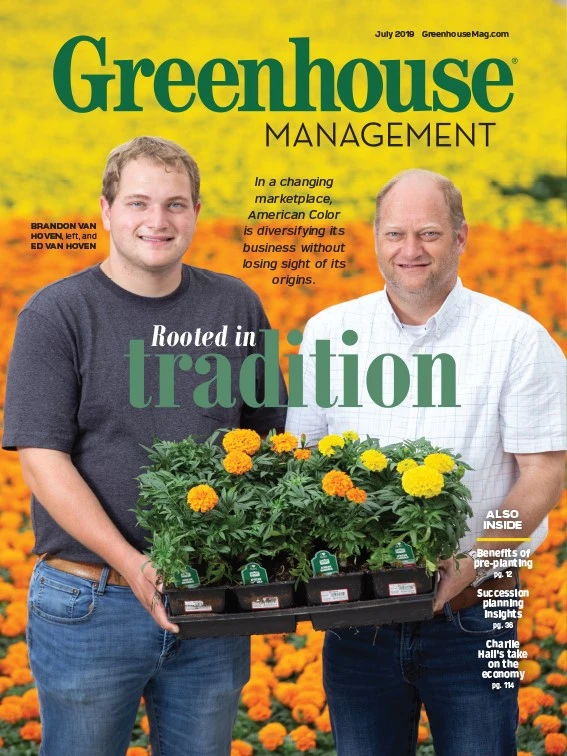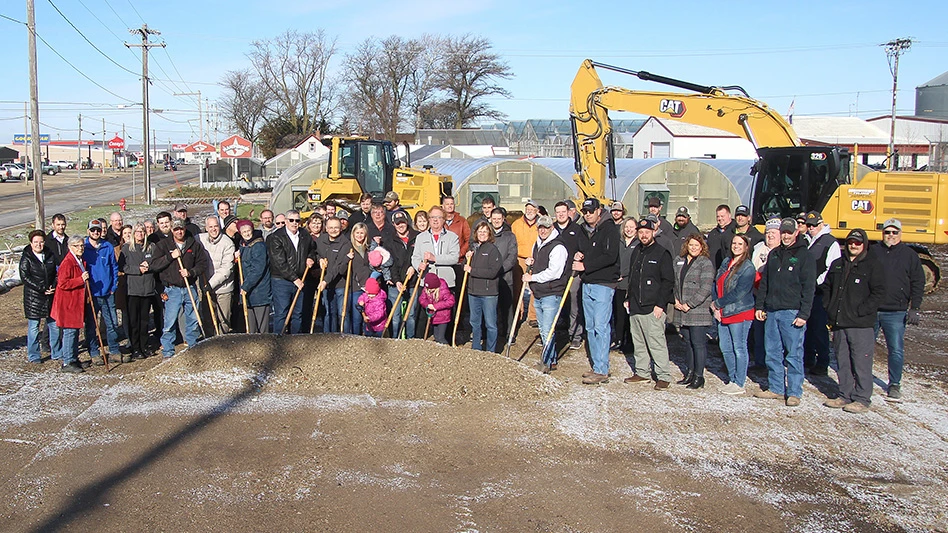

When George Lucas was young — about 5 or 6 years old — his parents would tie a block of wood to his foot so he could drive a truck to load their hay harvest.
“I would drive this monstrous truck through the field while he threw the hay in and she would pack it,” he says.
A few years later, as a 9-year-old huckster, George would pick produce from the garden and walk a mile to town — a “little kid coming to your door,” he says. He would ask, “‘Hey, you want to buy my tomatoes and peppers?’”
The principle to always do one’s best has guided George since those early days working in agriculture. He learned it at an early age from his parents, Nathaniel George Lucas Sr. and Joyce Lucas, and his father-in-law, Thomas French Gant, reinforced it later. It’s also part of the Christian philosophy that guides George.
George and his wife, Louise, built their first greenhouse in 1978 and opened Lucas Greenhouses the following year in Monroeville, New Jersey. What started as George’s ambition to have an acre of greenhouse space has since morphed into 1.7 million square feet of greenhouse production and 35 acres of outdoor growing space.
Among the mums and the poinsettias, the petunias and the begonias, are George and Louise’s employees — between 150 and 270 of them, depending on the season. George says they make Lucas Greenhouses what it is, and he works right with them.
“In the springtime, we do work [15-hour days] sometimes, and I’m here the whole time, plus some, probably,” George says. “It’s not like I’m telling them what to do and I’m going on my boat and chilling out and enjoying the spoils of war, but I work with them side by side.”
The workplace and atmosphere were inviting enough to employ all three of George and Louise’s children — Lacey Lucas, the oldest, Corey Goetsch, and Nate Lucas, the youngest. None of them were told they had to work in the family business. But they do, and they are close in their relationships and proximity, working and spending family time together, and taking vacations together.
Corey says her father “leads with integrity,” and she has never heard him speak poorly about another person.
“His reputation is one of just always being kind and giving to people,” Corey says. “He gives people the benefit of the doubt — he wants people to know that he cares about them. He treats everyone like they are the most important person in the world.”
George learned some of these qualities from his father and father-in-law, as well as his former pastor, Mark Franklin of Hardingville Bible Church, who passed away from cancer in 2013. After his father and father-in-law, George says Pastor Franklin was the most influential person in his life.
“I called on him in the middle of the night in storms, for family emergencies, and just about anything else and he was always there,” George says.
George leaves a lasting impact on many people he comes across. One of them is Joe Moore, who started working for George in 1980, at age 11. When Joe started, he cleaned, spaced, hung and filled pots. Now, working as Lucas Greenhouses’ head grower after 39 years at the business, Joe says he learned numerous leadership lessons from George and Louise “via osmosis.” But some of the main ones are the importance of loyalty, treating people well and being hands-on.
“I probably don’t [know] of too many greenhouse owners with operations of this size that would be the first one out of bed and over to the greenhouse at 2 a.m. when a boiler alarm goes off or grabs the mop to clean up the men’s room when the toilet backs up, but George does that,” Joe says.


The early years
George Sr. was a farmer and raised a small herd of dairy cows, and grew hay, corn and other crops. Once, when George Jr. was a child, his father ended up in a body cast, and he still completed his work.
“I was really young at the time, but I can remember him crawling through the tomato field picking tomatoes because he didn’t have any help and he just had to do it,” George says.
George Sr.’s wife, Joyce, was diagnosed with lymphoma in her mid-20s. Without insurance for her, George Sr. paid for her treatments and lost all of his dairy cows. He didn’t go bankrupt and kept working. Next, he started a new job at the New Jersey Turnpike — in the mid-’60s, George Jr. estimates — to get health insurance and support the family.
The family’s agriculture legacy continued when George Jr. ventured into greenhouse production at age 14. He applied at a large, local greenhouse and wasn’t hired. But he was hired at VASK Greenhouses, a smaller, hobbyist-type operation ran at the time by two university professors, Don Vorreyer and Jim Anthony. Within four years, he says, he did everything there aside from signing checks.
The professors encouraged him to attend college, and he became the first in his family to do so. He spent a year at Delaware Valley College in Doylestown, Pennsylvania. It was expensive, and he didn’t feel like it was the right fit, so he left. Next, he completed a work program at Cumberland County College, while continuing his job at VASK Greenhouses.
“I was constantly trying to grow that business, and we got to the point where they were like, ‘Look, we don’t want to get any bigger. We’re doing this for enjoyment,’” George says. “I wanted to start my own business. They helped a little bit with that process as far as giving me time to go do things.”
George and Louise, being the oldest children in their families and bonding over a love of the outdoors, decided to start their own next chapter and founded Lucas Greenhouses.
“It was just cool being able to take cuttings, pick and root them, do your own thing, and I always say — independent greenhouse guys — we’re independent — we don’t like being told what to do,” George says. “That was all part of owning my own thing, I was like, ‘I’m my own boss, I make my own mistakes and I make my own successes.’ We were both kind of the same in that, so that’s why we decided to start this.”



George and Louise
George and Louise’s parents all knew each other from attending school together. Working in agriculture — his parents at their small truck farm and her parents at their large fruit and vegetable farm growing peaches, string beans, and other crops — they sent their children to 4-H camp together.
Louise was and still is friends with George’s sister Susan, who she shared a cabin with during camp at age 12.
“On the way home, on the bus, she goes, ‘My brother’s back there,’ and I go, ‘Oh yeah, which one?’ And I turned around and looked, and she goes, ‘That’s the one right there,’” Louise says. “And I said, ‘Oh, he’s cute!’ She turns around and she looks at me, and she goes, ‘No, he’s not — he’s ugly.’ I said, ‘No, he’s cute.’ And I said to her, ‘I’m going to marry him someday!’”
They were married on May 14, 1977 — he at age 21, her at 20. They bought 4 acres from Louise’s father in 1978 and began expanding the business from there. George worked during the day at VASK for the first couple years after he and Louise opened Lucas Greenhouses. She would work during the day at their greenhouse, then at night they would plant and build structures.
In the early days of Lucas Greenhouses, times were tough financially, George says. For additional money, Louise canned tomatoes, and they both raised animals for meat.
“Being both of us were firstborn, both of us were very strong-headed — that was really the challenge as to us working together 12-, 14-, 16-hour days — sleeping together — you’re not getting away from each other to let things cool down when things happen,” he says. “But it was good. I wouldn’t have changed a thing.”

Louise was inspired by her in-laws. George says Louise would take Joyce to her chemotherapy treatments.
Louise would see her mother-in-law vomit on the way home, then make dinner with a bucket next to her — a testament to her determination to see things through. In 1980, she lost her life to lymphoma.
“I loved my mother-in-law, and she loved me,” Louise says. “We had a really good relationship. And my father-in-law, he’s a pulls-no-punches guy. If he thinks something, he’s going to tell you how it is. Those traits are present in my husband. If you look at the parents, you know what the kid’s going to be.”
George accepted the Lord as his savior when he was 26, Louise says, and from then on, the couple began to talk things over and work together more often.
“We’re working side by side,” she says. “No matter what happens — good, bad or indifferent — I’m always there for him to say, ‘Look, we can get through this — it doesn’t matter. We’ll work harder.’”
George’s sister Susan married and started a family before George and Louise. When Susan had her second child, Louise brought up the topic of having children with George. He told her he wasn’t ready. Every time she asked him after that, she received the same response.
“He actually didn’t like to be around kids,” she says. “And so then at 28, I had given up, I said, ‘Well, I guess we’re not going to have kids.’ So then he decided at 29 — he goes, ‘You know what, I think I’m ready for kids.’ I think I almost had a heart attack and fell over backwards.”
Between Louise’s willingness to forego having children and her abandoning plans to become a professional interior decorator and landscape designer to build and run greenhouses with George, Corey says her mother’s selflessness is one of the things that makes her special.
“She was willing to sacrifice anything and everything for him and for his dreams,” she says.



Prioritizing family
Aside from his faith, George says family is the most important thing in life to him. That was true in 1978, when his father, two brothers and two sisters, and Louise’s father, two brothers and two sisters, built the first greenhouse. And it holds true now, with his children and grandchildren around, as well as his sisters-in-law, brothers-in-law, nephews and cousin working at the business.
Lacey, George and Louise’s oldest child, is not married. Nate has two boys, Nathaniel George Lucas IV and Finnegan (Finn), with his wife Svetlana, and Corey has two boys, Lincoln and Kolton, with her husband Marques.
“We live within probably 700 yards of each other, and we eat together every night,” George says.
In her current day-to-day role, Louise handles accounts payable, payroll taxes and taxes. Occasionally, she puts together planter boxes for weddings and cuts and shapes plants. In her free time, she teaches Sunday school and donates money and items, such as desks and chairs, to the Christian school her children attended. Like George, she places family right behind her faith.
The family spends so much time together that Louise compares them to the characters in “My Big Fat Greek Wdding.”
“We cook together, we play together, we hike together,” she says. “We’re always together.”
After retiring from the New Jersey Turnpike, George Sr. took up full-time work at Lucas Greenhouses. He has since stepped back from the business to take care of his second wife, Dolly — they married in 1991 — but occasionally shows up to help at the greenhouse or mow their lawn.
Over the years, George’s youngest brother, Bill, built and maintained greenhouses and helped in other ways. George says he was his “right arm.” He died of sleep apnea in 2002 at age 36.
“That was a pretty dramatic time for us, but we were in a growth mode,” George says. “So Joe [Moore] had been here all along. Joe’s brother, Tim ... had got out of college and was looking for something, so he came in to help with our sales side because I was doing all that at the time by myself.”
Help from family comes in the form of contract work, too. George’s brother Mark is a masonry contractor and does much of the concrete work for Lucas Greenhouses.
George says he wants other members of his team to become part of the family, and he tries to treat them as such. Some of them have been there since the beginning, like Joe as well as Lori Fletcher, who handles data entry and was the first employee to learn how to use computers.
From early on, George says his philosophy has been, “Everyone else gets paid before I do.” He would pay his employees to make sure their bills and mortgages were paid, and he would live on what was left.
“I love my husband’s philosophy — if something costs more money or we need more money, we’ll make more — it’s only money,” Louise says. “It’s the truth. It’s not a person; it’s not a life. It’s money. It’s there to use to better your life and give you enjoyment out of it. What matters to us is family.”
Lacey handles payroll, balancing checkbooks and keeping credit cards, while Corey handles accounts payable, human resources, workers’ compensation, photography and other tasks.
George and Louise are showing Nate how to do everything in the greenhouse because the plan is for him to eventually take over the business.
“We’re trying to get him to take the baby steps — to learn to pull weeds, to learn to put on hangers, to learn to work in shipping, to be the gopher — because that way, when you ask people to do a job, you’ve done every job in there, from putting on chemicals to pulling irrigation hoses to pulling orders to leaning against benches that rip your pants and your legs are always bruised,” Louise says. “That way, you know what it’s like when you make a demand on people.”
While he’s still at the helm for the foreseeable future, George plans to continue to improve efficiencies. The operation has installed LED lights and plans to add more of them in propagation, generally increase propagation space, expand the shipping area and hire more salespeople and assistant growers in the young plants division. Next year, he may bring in additional H-2A workers to plant mums in the fields.
Through it all, George plans to be right there working alongside everybody.
“Again, I’m not buying an island somewhere and saying, ‘Thank you very much,’” he says. “I want everybody’s quality of life to get better as we get better, and I think we’ve been able to do that.”

Explore the July 2019 Issue
Check out more from this issue and find your next story to read.
Latest from Greenhouse Management
- Pennsylvania Horticultural Society shares top gardening trends from 2025 Philadelphia Flower Show
- California Spring Trials 2026 dates announced
- Les Evans promoted to DRAMMwater segment manager, Al Zylstra to retire
- Hoffmann Family of Companies to acquire N.G. Heimos Greenhouses
- GIE Media Horticulture Group wins five regional 2025 Azbee Awards of Excellence
- Grant awarded to test western U.S. wood species for use as wood fiber potting substrate
- Pennsylvania Horticultural Society announces 2025 Gold Medal Plant winners
- Oasis Grower Solutions announces new Southeast territory sales manager





